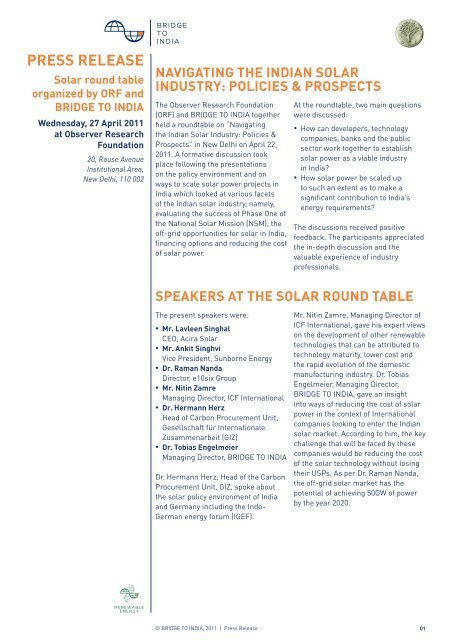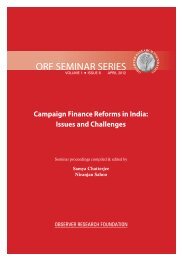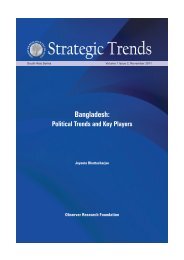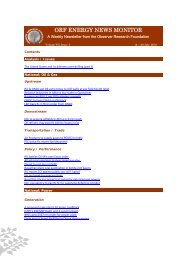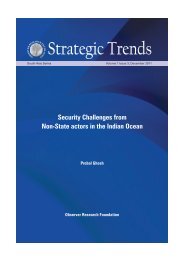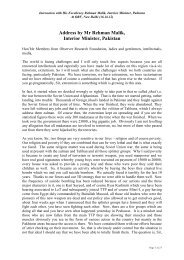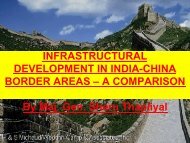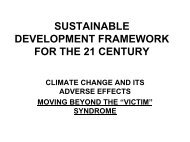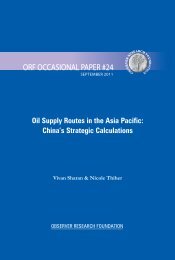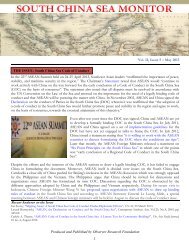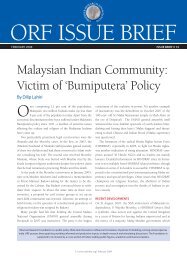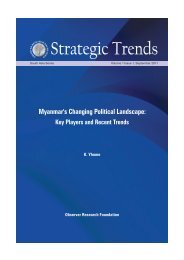White paper For MiniStry oF neW and reneWable energy (Mnre)
White paper For MiniStry oF neW and reneWable energy (Mnre)
White paper For MiniStry oF neW and reneWable energy (Mnre)
Create successful ePaper yourself
Turn your PDF publications into a flip-book with our unique Google optimized e-Paper software.
preSS releaSe<br />
Solar round table<br />
organized by orF <strong>and</strong><br />
bridge to india<br />
Wednesday, 27 april 2011<br />
at observer research<br />
Foundation<br />
20, Rouse Avenue<br />
Institutional Area,<br />
New Delhi, 110 002<br />
navigating the indian Solar<br />
induStry: policieS & proSpectS<br />
The Observer Research Foundation<br />
(ORF) <strong>and</strong> BRIDGE TO INDIA together<br />
held a roundtable on “Navigating<br />
the Indian Solar Industry: Policies &<br />
Prospects” in New Delhi on April 22,<br />
2011. A formative discussion took<br />
place following the presentations<br />
on the policy environment <strong>and</strong> on<br />
ways to scale solar power projects in<br />
India which looked at various facets<br />
of the Indian solar industry, namely,<br />
evaluating the success of Phase One of<br />
the National Solar Mission (NSM), the<br />
off-grid opportunities for solar in India,<br />
financing options <strong>and</strong> reducing the cost<br />
of solar power.<br />
SpeakerS at the Solar round table<br />
The present speakers were:<br />
• Mr. lavleen Singhal<br />
CEO, Acira Solar<br />
• Mr. ankit Singhvi<br />
Vice President, Sunborne Energy<br />
• dr. raman n<strong>and</strong>a<br />
Director, e10six Group<br />
• Mr. nitin Zamre<br />
Managing Director, ICF International<br />
• dr. hermann herz<br />
Head of Carbon Procurement Unit,<br />
Gesellschaft für Internationale<br />
Zusammenarbeit (GIZ)<br />
• dr. tobias engelmeier<br />
Managing Director, BRIDGE TO INDIA<br />
Dr. Hermann Herz, Head of the Carbon<br />
Procurement Unit, GIZ, spoke about<br />
the solar policy environment of India<br />
<strong>and</strong> Germany including the Indo-<br />
German <strong>energy</strong> forum (IGEF).<br />
© BRIDGE TO INDIA, 2011 | Press Release<br />
At the roundtable, two main questions<br />
were discussed:<br />
• How can developers, technology<br />
companies, banks <strong>and</strong> the public<br />
sector work together to establish<br />
solar power as a viable industry<br />
in India?<br />
• How solar power be scaled up<br />
to such an extent as to make a<br />
significant contribution to India’s<br />
<strong>energy</strong> requirements?<br />
The discussions received positive<br />
feedback. The participants appreciated<br />
the in-depth discussion <strong>and</strong> the<br />
valuable experience of industry<br />
professionals.<br />
Mr. Nitin Zamre, Managing Director of<br />
ICF International, gave his expert views<br />
on the development of other renewable<br />
technologies that can be attributed to<br />
technology maturity, lower cost <strong>and</strong><br />
the rapid evolution of the domestic<br />
manufacturing industry. Dr. Tobias<br />
Engelmeier, Managing Director,<br />
BRIDGE TO INDIA, gave an insight<br />
into ways of reducing the cost of solar<br />
power in the context of International<br />
companies looking to enter the Indian<br />
solar market. According to him, the key<br />
challenge that will be faced by these<br />
companies would be reducing the cost<br />
of the solar technology without losing<br />
their USPs. As per Dr. Raman N<strong>and</strong>a,<br />
the off-grid solar market has the<br />
potential of achieving 50GW of power<br />
by the year 2020.<br />
01
dr. tobias engelmeier, Managing director,<br />
bridge to india spoke about the ways<br />
of reducing the cost of solar power in<br />
the context of international companies<br />
looking to enter the indian solar market.<br />
participants networking during<br />
lunch break.<br />
the identiFied challengeS<br />
During the discussion, key challenges<br />
were identified:<br />
• High capital costs<br />
• Need for an improved manufacturing<br />
base <strong>and</strong> R&D services<br />
• Need to fill the gap of long term<br />
finance schemes for solar projects<br />
• Better qualified project developers<br />
Many solar projects fail to attract<br />
sufficient attention <strong>and</strong> funding. Also,<br />
most of the developers <strong>and</strong> financiers<br />
the identiFied opportunitieS<br />
All participants agreed that the market<br />
offers interesting opportunities<br />
such as:<br />
• On-grid projects with different<br />
off-take opportunities for PV<br />
• Long-term potential of CSP<br />
• Off-grid potential in fields such as<br />
commercial rooftops or telco towers<br />
India has 300 sunny days per year<br />
<strong>and</strong> receives an hourly radiation of<br />
200MW/km2. The usage of 10% of<br />
the l<strong>and</strong> for harnessing solar <strong>energy</strong><br />
can produce 8,000GW of installed<br />
capacity. Solar power, therefore, can<br />
easily address India’s long-term<br />
power requirements.<br />
Renewable Energy Certificates (RECs)<br />
under the Renewable Purchase<br />
Obligations (RPO) have the potential<br />
to provide a significant dem<strong>and</strong>-side<br />
pull for solar <strong>energy</strong>. RECs have<br />
FolloW-up: <strong>White</strong> <strong>paper</strong> <strong>For</strong><br />
<strong>MiniStry</strong> <strong>oF</strong> <strong>neW</strong> <strong>and</strong><br />
re<strong>neW</strong>able <strong>energy</strong> (<strong>Mnre</strong>)<br />
The key inputs from the roundtable will<br />
be compiled <strong>and</strong> sent to the MNRE to<br />
ensure that policy makers are aware of<br />
industry concerns.<br />
© BRIDGE TO INDIA, 2011 | Press Release<br />
lack prior experience as solar is<br />
still an upcoming <strong>energy</strong> resource.<br />
This, in conjunction with poor solar<br />
irradiation data, has made banks<br />
hesitant to provide debt finance. The<br />
experts at the round table emphasized<br />
on the transparency required in the<br />
bidding process of the solar projects.<br />
This, according to them, would help in<br />
procuring qualified project developers<br />
to execute the solar projects in<br />
a professional manner.<br />
become a second viable off-take option<br />
for developers. They can choose to<br />
either sell their solar power through<br />
preferential feed-in-tariffs under the<br />
NSM or generate RECs.<br />
Reverse bidding of tariffs under<br />
the NSM has made MW scale grid<br />
connected plants risky due to low<br />
tariffs. This makes the diesel offset<br />
market of 50GW more viable as this<br />
market is self sustainable <strong>and</strong> does not<br />
need government subsidies.<br />
The roundtable proved to be a<br />
successful endeavor in not only<br />
highlighting various recommendations<br />
that may prove effective in benefitting<br />
the Indian solar market, but it also<br />
provided a forum for people from the<br />
government, think tanks <strong>and</strong> media to<br />
consider these issues together with<br />
industry experts.<br />
There will be a follow up event to this<br />
at ORF centre which will be held on<br />
Friday, 5 th of august 2011.<br />
02
about the<br />
organiSerS<br />
<strong>For</strong> further information<br />
please contact:<br />
Ms. isabelle-Jasmin roth<br />
Director, BRIDGE TO INDIA<br />
isabelle-jasmin.roth@<br />
bridgetoindia.com<br />
<strong>For</strong> further information<br />
please contact:<br />
Ms. lydia powell<br />
Head, Centre for Resources<br />
Management<br />
Observer Research Foundation<br />
lydia@orfonline.org<br />
bridge to india<br />
BRIDGE TO INDIA is a consulting<br />
company with an entrepreneurial<br />
approach based in New Delhi. The<br />
company focuses on environmental<br />
technologies in the Indian market.<br />
Furthermore, BRIDGE TO INDIA links<br />
this expertise to urban planning<br />
<strong>and</strong> processes. Through customized<br />
obServer reSearch Foundation<br />
Observer Research Foundation (ORF)<br />
is a not-for-profit <strong>and</strong> multidisciplinary<br />
public policy think tank affianced in<br />
developing <strong>and</strong> considering policy<br />
alternatives on a wide-range of<br />
issues of national <strong>and</strong> international<br />
importance. Some of ORF’s key areas<br />
of research include security affairs,<br />
international relations, politics <strong>and</strong><br />
governance, economy <strong>and</strong> development<br />
<strong>and</strong> resources management.<br />
© BRIDGE TO INDIA, 2011 | Press Release<br />
solutions for its clients, BRIDGE TO<br />
INDIA contributes to a sustainable<br />
world by implementing the latest<br />
technological <strong>and</strong> systemic innovations<br />
where their impact is the highest.<br />
www.bridgetoindia.com<br />
The fundamental objective of ORF is<br />
to influence formulation of policies<br />
for building a strong <strong>and</strong> prosperous<br />
India in a globalised world. It upholds<br />
a range of informal contacts with<br />
policymakers, politicians, civil<br />
servants, the media <strong>and</strong> business<br />
leaders in India <strong>and</strong> abroad.<br />
www.orfonline.org<br />
a formative discussion took place following the presentations on the policy environment <strong>and</strong> scaling solar power projects in india.<br />
03


